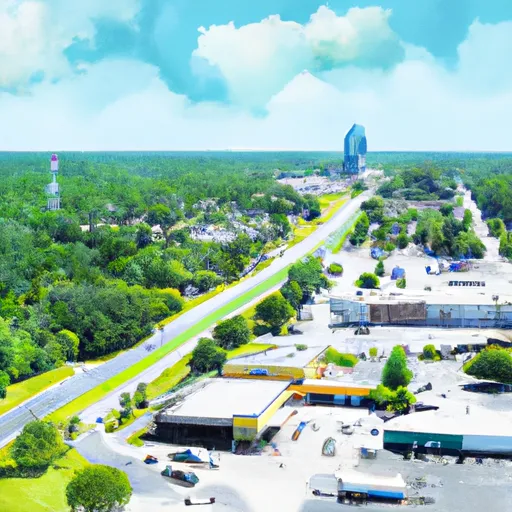-
 Snoflo Premium
Snoflo Premium
Get unlimited access to all our content
With no Ad interruptions! - Start Your Free Trial Login with existing account
Yulee
Eden Index
Climate
7.6
•
Recreation
5.8
•
Community
3.1
•
Safeguard
5.8/10

Yulee is a small town located in Nassau County, Florida. The town experiences a humid subtropical climate, characterized by hot, humid summers and mild, short winters. Summers in Yulee are typically hot, with temperatures often soaring into the high 80s to low 90s Fahrenheit. Winters are mild, with temperatures averaging in the mid-60s. Yulee receives a considerable amount of rainfall throughout the year, with the wettest months being June through September.
Hydrologically, Yulee is situated near the St. Marys River, which forms a part of the border between Florida and Georgia. The river provides opportunities for fishing, canoeing, and kayaking. Additionally, Yulee is close to the Intracoastal Waterway, offering residents and visitors access to boating and various water sports.
Outdoor recreation in Yulee is abundant, with several parks and natural areas to explore. Amelia Island State Park, located nearby, provides opportunities for swimming, sunbathing, and hiking. Fort Clinch State Park offers camping, fishing, and birdwatching, along with guided tours of the historic fort. Nature enthusiasts can also visit the Timucuan Ecological and Historic Preserve, which features hiking and wildlife observation. With its mild climate and proximity to waterways, Yulee offers a range of outdoor activities for both residents and visitors to enjoy.
What is the Eden Index?
The Snoflo Eden Index serves as a comprehensive rating system for regions, evaluating their desirability through a holistic assessment of climate health, outdoor recreation opportunities, and natural disaster risk, acknowledging the profound impact of these factors on livability and well-being.
Climate Health Indicator (CHI): 7.6
Yulee receives approximately
1292mm of rain per year,
with humidity levels near 88%
and air temperatures averaging around
21°C.
Yulee has a plant hardyness factor of
9, meaning
plants and agriculture in this region tend to thrive here all year round.
By considering the ideal temperature range, reliable water supplies, clean air, and stable seasonal rain or snowpacks, the Climate Health Indicator (CHI) underscores the significance of a healthy climate as the foundation for quality living.
A healthy climate is paramount for ensuring a high quality of life and livability in a region, fostering both physical well-being and environmental harmony. This can be characterized by ideal temperatures, reliable access to water supplies, clean air, and consistent seasonal rain or snowpacks.
Weather Forecast
Streamflow Conditions
St. Marys - Satilla
Area Rivers
St. Marys - Satilla
Snowpack Depths
St. Marys - Satilla
Reservoir Storage Capacity
St. Marys - Satilla
Groundwater Levels
Recreational Opportunity Index (ROI): 5.8
The Recreational Opportunity Index (ROI) recognizes the value of outdoor recreational options, such as parks, hiking trails, camping sites, and fishing spots, while acknowledging that climate plays a pivotal role in ensuring the comfort and consistency of these experiences.
Access to outdoor recreational opportunities, encompassing activities such as parks, hiking, camping, and fishing, is crucial for overall well-being, and the climate plays a pivotal role in enabling and enhancing these experiences, ensuring that individuals can engage in nature-based activities comfortably and consistently.
Camping Areas
| Campground | Campsites | Reservations | Toilets | Showers | Elevation |
|---|---|---|---|---|---|
| Lake Delancy | 28 | 30 ft | |||
| Huguenot City Park | 40 | 10 ft | |||
| Rodman Rec Area | None | 68 ft | |||
| Osprey Cove Military - Mayport NS | None | 15 ft | |||
| Pelican Roost RV Military - Mayport NS | None | 14 ft | |||
| Hopkins Prairie | 21 | 35 ft | |||
| Salt Springs | 267 | 26 ft | |||
| Shanty Pond Recreation Area | 120 | 34 ft | |||
| Jacksonville NAS RV Military | None | 20 ft | |||
| Hanna City Park | 300 | 17 ft |
Catastrophe Safeguard Index (CSI):
The Catastrophe Safeguard Index (CSI) recognizes that natural disaster risk, encompassing floods, fires, hurricanes, and tornadoes, can drastically affect safety and the overall appeal of an area.
The level of natural disaster risk in a region significantly affects safety and the overall livability, with climate change amplifying these risks by potentially increasing the frequency and intensity of events like floods, fires, hurricanes, and tornadoes, thereby posing substantial challenges to community resilience and well-being.
Community Resilience Indicator (CRI): 3.1
The Community Resilience Indicator (CRI) recognizes that education, healthcare, and socioeconomics are crucial to the well-being of a region. The CRI acknowledges the profound impact of these elements on residents' overall quality of life. By evaluating educational resources, healthcare accessibility, and economic inclusivity, the index captures the essential aspects that contribute to a thriving community, fostering resident satisfaction, equity, and social cohesion.

